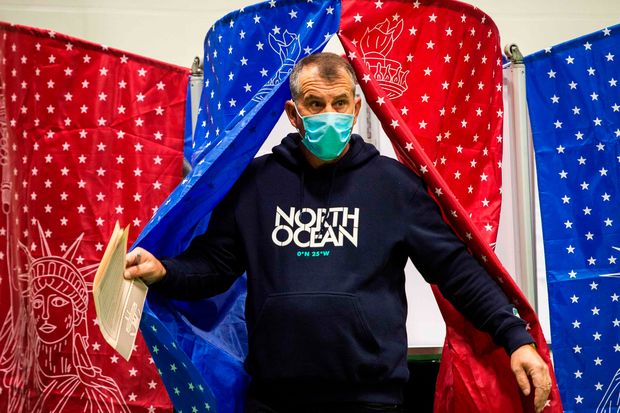
A man exits a polling booth at a polling station in Manchester, N.H., on Nov. 3. MarketWatch asked experts in mental health how they plan to spend election night and the days that follow.
Joseph Prezioso/Agence France-Presse/Getty Images
Mental-health professionals are trying to practice what they preach while they await results in one of the most emotionally fraught elections in recent history.
Election experts have warned that Election Day could be more like Election Week or Election Month: The historic surge in mail voting due to COVID-19 could result in some states’ vote counts extending days or weeks after Election Day, and pivotal swing states Michigan, Pennsylvania and Wisconsin may take longer to report results.
Meanwhile, as President Donald Trump’s face-off against former vice president Joe Biden comes to a head Tuesday night and Wednesday morning, voters from both major parties appear equally worried about what might happen if their guy loses: 65% of Republicans and GOP-leaning independents strongly agree with the statement “I am afraid of what will happen if my candidate for President does not win,” while 66% of Democrats and Democratic leaners say the same, according to a Gallup poll conducted from mid- to late October.
MarketWatch asked experts in mental health how they plan to spend election night and the days that follow — particularly if there are no clear results for some time — in hopes of gleaning some wisdom and healthy coping mechanisms.
Joan Cook, a clinical psychologist and Yale School of Medicine associate professor who has worked with trauma survivors, noted that her own anxiety level was high.
“The thick discord and deep divide is unnerving, and I want so much more and better for our country,” she told MarketWatch in an email. “As a psychologist, I know that good mental health can take preparation and practice. I’m doing everything I suggest my clients do.”
Here’s what Cook and other mental-health professionals said they’ll be up to during this election week:
Focusing on what they can control
“First and foremost, I voted because it helps me to feel less powerless,” Cook said on Tuesday. “It reminds me that I am part of an important collective, that I have power, and my voice matters.”
Mary Alvord, a Maryland-based child psychologist who studies resilience, said she had voted early. “This morning I said to my husband, ‘We both voted, we’ve both spoken to people, we both advocate for the concerns that are important to us, and we can’t control the outcome — so we just have to do our best for our part,’” she said.
“ ‘It’s not something that’s going to extend for two days or a week or possibly into a Supreme Court decision.’ ”
Alvord, who was raised by parents who left communist Russia, said she values voting and finds it empowering to encourage others to do the same. “Taking action makes me feel hopeful,” she said.
For Jonathan Singer, the president of the American Association of Suicidology and an associate professor of social work at Loyola University Chicago, taking control means grading papers until bedtime on election night. It’s a finite activity that will leave him with a sense of accomplishment upon completion, he said — and, thankfully, “it’s not something that’s going to extend for two days or a week or possibly into a Supreme Court decision.”
Paying attention to their bodies
“During times of overwhelming anxiety, it’s best to turn towards your mind and body to understand what it’s telling you about your stress reaction,” Theresa Nguyen, the chief program officer for Mental Health America, said in an email. “I have to pull back, for example, if stress starts to impact my heart rate, increases tension in my body, results in poor sleep, and most importantly if it gets in the way of being kind in my relationships.”
To cope, Nguyen said, she compartmentalizes, identifies and focuses on what she can control, and steers clear of situations that tip her toward an angry outburst or anxiety attack.
“ ‘Anxiety and fear can bring people like a moth to the newsfeed light.’ ”
Steering clear of social media — and taking in news carefully
Dion Metzger, a board-certified psychiatrist and co-author of “The Modern Trophy Wife: How to Achieve Your Life Goals While Thriving at Home,” said she was staying away from social media — “anxiety breeds anxiety,” she said — and advising her patients to do the same. “Everyone responds to anxiety differently (irritability, catastrophizing, denial, etc.) and we [are] seeing it poured all over social media,” she said in an email.
Singer also said he would stay off social media. “I don’t have the emotional space to go down a rabbit hole,” he said.
Cook said she was keeping informed about current events, including the election, but taking in the news “in short doses from reliable sources.” “Anxiety and fear can bring people like a moth to the newsfeed light,” she said.
Nguyen plans to take peeks at written news media as she mostly avoids consuming information until the election results are more settled, she said. She will likely avoid watching news on a screen, she said, “because it almost certainly results in me being emotionally reactive, regardless of who is talking.”
“I’m also advising [others] to limit their exposure to cable news, as it also can be anxiety-provoking with the emotional rollercoaster of hearing the polling reports from across the country,” Metzger added.
Staying grounded
Melissa Whitson, an associate professor of psychology at the University of New Haven, said she would be employing grounding techniques that bring awareness “to the here and now.” These techniques, which often employ the senses to distract from difficult emotions, vary from person to person and could include activities like gardening or savoring delicious food.
Whitson, for her part, finds it grounding to take a deep breath, smell her kids’ hair, and listen to music by funk artists like George Clinton.
“ ‘I am rewatching funny sitcoms on Netflix to distract myself. It’s predictable and makes me smile, which is a perfect antidote to election anxiety.’ ”
Reaching out for social connection
Cook is reaching out to other people for support and offering the same to friends and family members. Singer also encouraged people to reach out to social connections who might be anxious about the outcome of the election, having done so himself.
“You’re letting them know that you’re not in this alone,” he said. “We’re all anxious — everybody, regardless of who you’re voting for.”
Indulging in distractions
“I am rewatching funny sitcoms on Netflix NFLX, +0.64% to distract myself,” Metzger said. “It’s predictable and makes me smile, which is a perfect antidote to election anxiety.” She’s enjoying “Schitt’s Creek,” which she says is lighthearted and family-oriented.
The New York Times has created an Election Distractor website to take people’s minds off politics, Whitson said, and children’s book author and illustrator Mo Willems will also be leading a “Democracy Doodle” event on the Kennedy Center website Tuesday at 7 p.m. Eastern.
Alvord likes to take walks and listen to audiobooks, a hobby she has developed during the pandemic to regulate her emotions and break up the time she spends sitting and having telehealth appointments. She is currently listening to “Code Girls” by Liza Mundy.
And Singer enjoys “little five-minute vacations” to watch clips of indie-pop duo Tegan and Sara or TV host Graham Norton. “I love looking at expensive real estate,” he added. “I could get angry about the fact that somebody has a pool on their 30th-floor condo but at the same time, I’m just like, ‘Wow that’s beautiful.’ It literally takes me out of my brain for a minute.” The key is to make it a short distraction, he said, rather than getting lost on the internet for hours.
Practicing self-care — especially when it comes to sleep
Metzger’s self-care strategies include “at least seven hours of sleep, tennis, Pinterest fashion searches, burning candles, snuggling under [a] weighted blanket, body scrubs and taking myself out for lunch,” the last of which she has done for the past two consecutive days.
“I’m doing everything I can to maintain a good sleep schedule, get exercise, and eat balanced and nutritious meals,” Cook added.
Whitson said she would try to fit in healthy coping mechanisms like deep breathing, yoga and a bundled-up walk outside. What about less healthy coping mechanisms? “There’ll definitely probably be some wine in my future this evening,” she said.
Singer, meanwhile, said he wants to hit the hay by midnight.
“The more intentional I am about my sleep, the less sleep-deprived anxiety or fear gets triggered,” he said. “We think of self-care as doing something different, or doing more … but actually, stopping and sleeping is a huge win for self-care.”








